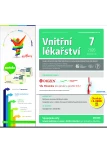-
Medical journals
- Career
Ethical connotations of the treatment of COVID-19 disease
Authors: Anetta Jedličková
Authors‘ workplace: Fakulta humanitních studií, Univerzita Karlova (FHS UK)
Published in: Vnitř Lék 2020; 66(7): 8-12
Category:
Overview
The current situation of the COVID-19 pandemic has brought entirely new challenges to the health care professionals as well as to the general public, and together with them a number of new problems that the society needs to deal with. One of the groups of new challenges are undoubtedly ethical issues. For physicians in their daily practice, it is important to realize the significant role of ethical aspects during an epidemic or pandemic. The article aims to acquaint health care professionals with ethical principles in general, with their distinctiveness and application in the course of infectious diseases, and with the main ethical aspects of the COVID-19 treatment during the pandemic. One of the most important topics of the subject-matter experts’ discussions, which took place in connection with preparation of recommendations for the allocation criteria of scarce resources in the provision of health care services in the context of the COVID-19 pandemic, is particularly the allocation of scarce resources based on age and discrimination. The intention of the article is to support healthcare professionals to fulfil their responsibilities in providing health care services in a professional and equitable way that does not conflict with any legal obligations.
Keywords:
age discrimination – allocation of scarce resources – COVID-19 – ethical aspects – ethical dilemmas – ethical principles – Medical ethics
Sources
1. SDĚLENÍ Ministerstva zahraničních věcí č. 96/2001 Sb.m.s. [online]. [cit. 2020-07-20]. Dostupné z: https://www.lkcr.cz/doc/cms_library/96-2001-umluva-o-lid-pravech-a-biomedicine-100419.pdf
2. Zákon č. 372/2011 Sb., o zdravotních službách a podmínkách jejich poskytování. [online]. [cit. 2020-07-20]. Dostupné z: https://www.zakonyprolidi.cz/cs/2011-372
3. Zákon č. 258/2000 Sb., o ochraně veřejného zdraví a o změně některých souvisejících zákonů. [online]. [cit. 2020-07-20]. Dostupné z: https://www.zakonyprolidi.cz/ cs/2000-258
4. Česká společnost paliativní medicíny ČLS JEP. Paliativní krizový management symptomů (nejen) u covid-19. [online]. [cit. 2020-08-08]. Dostupné z: https://www.etikaepidemie.cz/ files/ke-stazeni/cspm_1_krizovy_management_symptomu_kratka_a1.pdf
5. Černý D, Doležal A, Doležal T. Etická a právní východiska pro tvorbu doporučení k rozhodování o alokaci vzácných zdrojů při poskytování zdravotních služeb v rámci pandemie covid-19. [online]. [cit. 2020-08-08]. Dostupné z: https://www.etikaepidemie.cz/files/ke-stazeni/covid_19.pdf
6. World Health Organization. Ethics and COVID-19: resource allocation and priority-setting. [online]. [cit. 2020-08-10]. Dostupné z: https://www.who.int/ethics/publications/ethics-covid-19-resource-allocation.pdf?ua=1
7. Šejvl M, Agha P, Sobek T, et al. Vítězové a poražení: Právní a etické problémy současné koronakrize. Ústav státu a práva AV ČR: Praha 2020 : 58–84. ISBN 978–80–87439–45–6.
8. Dostál O. Právo: Sebrat ventilátor staršímu pacientovi a dát ho mladšímu by byl trestný čin. [online]. [cit. 2020-08-10]. Dostupné z: http://blog.aktualne.cz/blogy/ondrej-dostal. php?itemid=36550
Labels
Diabetology Endocrinology Internal medicine
Article was published inInternal Medicine

2020 Issue 7-
All articles in this issue
- Coagulopathy associated with COVID-19
- Current diagnosis and therapy in sarcoidosis
- Obstructive sleep apnea and hypertension: the role of gut microbiome
- CAR T-cells: hot news in cancer therapy
- Renal failure in multiple myeloma and its treatment
- Bone Metabolism in Inflammatory Bowel Diseases 2
- Metformin -associated lactic acidosis
- Tangier disease in family with the phenotype of familial hypercholesterolemia
- Hypoglycemia in non -diabetic patients
- Screening and brief intervention in illicit drug users
- Bone metabolism in inflammatory bowel diseases 1
- Ethical connotations of the treatment of COVID-19 disease
- Biomarkers for non-endoscopic examination of esophageal mucosa
- Risk of cardiovascular complications related to blood glucose concentration: from diabetes to prediabetes
- ERCP in patients after choledochodenoanastomosis
- Rationed nursing care as one of the indicators of the occurrence of medication errors
- A rare coincidence of a chylothorax and a hydrothorax caused by gastric adenocarcinoma – a case report
- A man with dysthymia (with negative evaluation of allmost all through his live) induced depression in his sensitive spouse
- Small bowel adenocarcinoma diagnosed by video capsule endoscopy in a patient with celiac disease: a case report and review of literature
- Internal Medicine
- Journal archive
- Current issue
- Online only
- About the journal
Most read in this issue- Hypoglycemia in non -diabetic patients
- Metformin -associated lactic acidosis
- Coagulopathy associated with COVID-19
- CAR T-cells: hot news in cancer therapy
Login#ADS_BOTTOM_SCRIPTS#Forgotten passwordEnter the email address that you registered with. We will send you instructions on how to set a new password.
- Career

